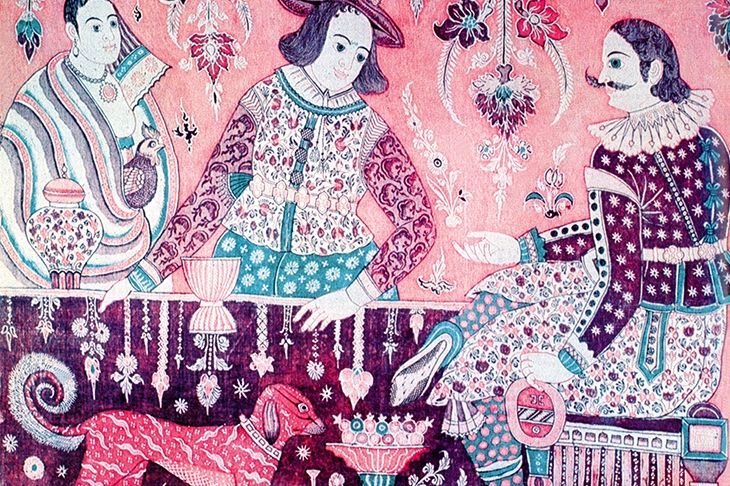Tudor merchants — shivering in furs in tiny creaking ships, sailing through the ice of unknown winter seas — knew something that today’s careworn EU and civil service officials might be irritated to hear: that despite all travails, trade deals can sometimes be sexy, thrilling and epic.
In 16th-century London, plans to open up fresh trading routes across the world were also about vaulting leaps of fantastical imagination, and naturally also about slavering greed. Down by the Thames, men of property would dream of alien Cathay, and of realms where the beaches, they thought, would glitter brilliant red and green with loose rubies and emeralds. Men were crossing oceans with ever-greater cartographical confidence: much better a private ship than a vulnerable caravan of mules trekking the bandit-haunted silk roads. England was opening itself up not merely to a new age of Reformation but also to the start of modern economics: speculation and investment backed by loans.
So even without today’s endless Punch-and-Judy pub-fight drama of Brexit, it is very pleasing to have a book that focuses specifically on the rise of London as a global trading city in the Tudor era. Like all the best stories, it is about the timeless tides of power and influence. ‘Merchants had an international view,’ notes the historian Stephen Alford, ‘whose values and merits sometimes transcended those of Europe’s sovereign powers…’ Sometimes!
In the late medieval years, Antwerp was at the centre of European commerce. Merchants from many kingdoms mingled in its Bourse, guaranteed ‘freedom of movement’ and dealing in goods — rich spices, precious metals, gorgeous cloth — from faraway lands. The nascent banking dynasties — Fugger and Hochstetter — went to Antwerp too; and in the wake of the bankers came a taste for fine art, tapestries and stained glass. The yobbish Tudor English were deemed to lack the effortless sophistication of their continental counterparts.
Indeed, by the mid-16th century, the Tudor throne was hopelessly in debt, despite Henry VIII’s rapacious monastery-stripping; and here came one of those subtle shifts of power (certainly more subtle than the earthquake of the Reformation). Usury was forbidden in England: but gradually, throughout the century, ways were found — legal and semantic — by which money could be loaned for reasonable sums of interest, and this coincided with a sharpening desire for sea-borne trade.
Tudor London also came to enjoy another huge trading advantage. The kingdoms of Europe were roaring with religious violence, and this was too great a hindrance to merchants everywhere; conflict constipated flows of goods. London — with its relative stability — became a peaceful harbour. And so it was that ships filled with furs, wines and minerals increasingly jostled along the wharves of the Thames.
Alford’s approach is to avoid the familiar subjects of Tudor politicking and Thomas Cromwell, and focus instead on London’s great mercantile families: the Greshams, the Hakluyts and the Ishams, as wells as the bankers and money men. Shakespeare and John Dee also make an appearance. Alford is interested in the flavour of an increasingly cosmopolitan city life: the food, the clothes, the claret in merchants’ cellars, the stage dramas, the burning plagues. And through the men of enterprise we see modern capitalism being born.
There are terrific encounters: the merchant Anthony Jenkinson, writes Alford, had a talent for ‘the unknown, the alien, and the unfamiliar’. In 1557, he was hoping to find a sea route to Cathay via Scandinavia. Instead, he landed at Vologda, one of Russia’s main ports, and from there was driven by sled to the court of Ivan the Terrible, who was ‘covered all over in gold and precious stones’. The nascent Muscovy Company was cemented, and the appetite among London’s merchants for even further economic discovery was sharpened.
Alford’s book, though a little loose in structure, is consistently illuminating and filled with pleasing resonance. He observes that the painted portraits of these London power brokers were filled with symbolism. Then, as now, the City was a realm unto itself. Indeed, the crown was in great need of the City’s ingenuity: how else were the royal coffers to be filled? It was Thomas Gresham who brought the Royal Exchange to London; this was the edifice that came to overshadow Antwerp’s Bourse. Among the colonnades, even those with no business there were attracted to it simply for the spectacle of fortunes being made.
But with trade came ferocious international competition; and with the global inroads made by Spanish, Dutch and Portugese fleets, ambition became imperial and implacably ruthless. Lands such as America were there first to be ‘planted’ with colonists and then controlled.
By the sunset of the Elizabethan age, London’s mayor Sir Stephen Soame was among the investors to put money into a voyage ‘to the East Indies and the other islands and countries thereabouts’, intended to compete with the Dutch. The East India Company, the next stage of England’s economic evolution, would become one of the remorseless engines of imperial growth. In the days and years to come, what style of empire will Dr Liam Fox conjure for us?






Comments